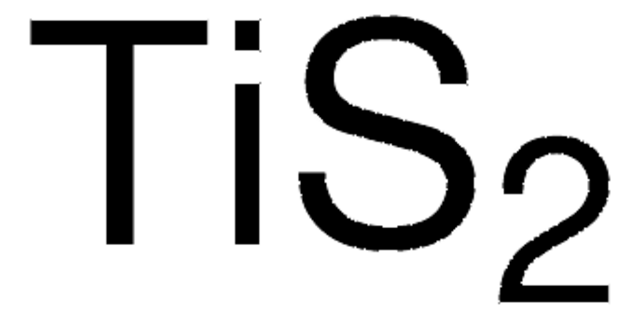484539
Germanium(II) sulfide
99.99% trace metals basis
Synonyme(s) :
Germanium monosulfide
Se connecterpour consulter vos tarifs contractuels et ceux de votre entreprise/organisme
About This Item
Formule linéaire :
GeS
Numéro CAS:
Poids moléculaire :
104.71
Numéro CE :
Numéro MDL:
Code UNSPSC :
12352300
ID de substance PubChem :
Nomenclature NACRES :
NA.23
Produits recommandés
Niveau de qualité
Essai
99.99% trace metals basis
Pertinence de la réaction
reagent type: catalyst
core: germanium
Pf
615 °C (lit.)
Chaîne SMILES
S=[Ge]
InChI
1S/GeS/c1-2
Clé InChI
VDNSGQQAZRMTCI-UHFFFAOYSA-N
Description générale
Differential thermal analysis of germanium (II) sulfide was investigated. Melting point of GeS is 665oC. GeS nanoparticles may be prepared by gas phase laser photolysis, to be used in lithium ion batteries. GeS films may be generated by electrochemical deposition and used as an electrolyte. A study also reports the formation of GeS clusters by laser ablation.
Application
- New flexible and transparent solution-based germanium-sulfide polymeric materials: This research presents the successful preparation of solution-based polymeric germanium sulfide materials, showcasing their potential applications in flexible and transparent electronics (DTB De Salvi, AE Job, SJL Ribeiro, 2015).
- Germanium monosulfide as a natural platform for highly anisotropic THz polaritons: Introduces alpha-germanium(II) sulfide (GeS) as a promising candidate for enhancing THz nanospectroscopy, significantly impacting materials science and optoelectronic device development (T Nörenberg et al., 2022).
Conditionnement
Packaged in amber poly bottles
Code de la classe de stockage
11 - Combustible Solids
Classe de danger pour l'eau (WGK)
WGK 3
Point d'éclair (°F)
Not applicable
Point d'éclair (°C)
Not applicable
Équipement de protection individuelle
Eyeshields, Gloves, type N95 (US)
Faites votre choix parmi les versions les plus récentes :
Déjà en possession de ce produit ?
Retrouvez la documentation relative aux produits que vous avez récemment achetés dans la Bibliothèque de documents.
Les clients ont également consulté
Sankaran Murugesan et al.
Langmuir : the ACS journal of surfaces and colloids, 28(13), 5513-5517 (2012-03-15)
A facile room-temperature electrochemical deposition process for germanium sulfide (GeS(x)) has been developed with the use of an ionic liquid as an electrolyte. The electrodeposition mechanism follows the induced codeposition of Ge and S precursors in ionic liquids generating GeS(x)
Joseph J Belbruno et al.
Physical chemistry chemical physics : PCCP, 12(30), 8557-8563 (2010-06-17)
Germanium sulfide clusters were generated by laser ablation of a solid sample. The resulting molecules were analyzed in a time-of-flight mass spectrometer. In addition to atomic germanium and diatomic sulfur, the spectra exhibited evidence for the existence of clusters containing
Thermal analysis of germanium (II) sulfide."
Ross L and Bourgon M
Canadian Journal of Chemistry, 46(14), 2464-2468 (1968)
Yong Jae Cho et al.
Chemical communications (Cambridge, England), 49(41), 4661-4663 (2013-04-16)
Germanium sulfide (GeS and GeS2) nanoparticles were synthesized by novel gas-phase laser photolysis and subsequent thermal annealing. They showed excellent cycling performance for lithium ion batteries, with a maximum capacity of 1010 mA h g(-1) after 100 cycles. Metastable tetragonal
Sean P Culver et al.
Journal of the American Chemical Society, 142(50), 21210-21219 (2020-12-08)
Strategies to enhance ionic conductivities in solid electrolytes typically focus on the effects of modifying their crystal structures or of tuning mobile-ion stoichiometries. A less-explored approach is to modulate the chemical bonding interactions within a material to promote fast lithium-ion
Notre équipe de scientifiques dispose d'une expérience dans tous les secteurs de la recherche, notamment en sciences de la vie, science des matériaux, synthèse chimique, chromatographie, analyse et dans de nombreux autres domaines..
Contacter notre Service technique









